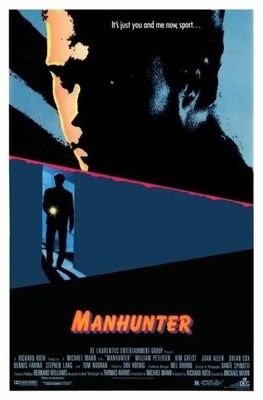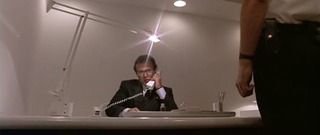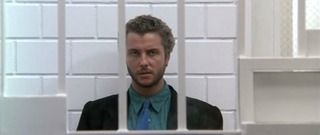
Manhunter
1986
Director: Michael Mann
Starring: William Petersen, Dennis Farina, Brian Cox, Tom Noonan
Let’s talk about the elephant in the room right away - The Silence of the Lambs. Ah, that cinematic bane of Manhunter. In 1986, no one gives a hooey about Hannibal Lecter, but five years later, he’s all the rage. Michael Mann must have been shaking his head in disbelief at how his Lecter film was met with box office ambivalence and Demme’s was both a commercial, critical, and award season success. And now that I’ve seen Manhunter, I’m more than a little incredulous as well. Manhunter is taut, thrilling, creepy, and all around fantastic. It doesn’t deserve to be considered “the forgotten Hannibal film.”
Red Dragon before Red Dragon, the movie tells of Will Graham (Petersen), a retired FBI agent who retired after he caught Dr. Hannibal Lecter (Cox, and yes, I’m sticking with the later spelling of the name). He had to retire because he caught Lecter using psychological profiling, a novel concept in 1986, and Lecter stuck in his head. Graham is enlisted by his friend Detective Crawford (Farina) to help solve the case of the Tooth Fairy killer, a psychopath who murders whole families in their homes. The FBI has bupkus on his motives or where he’ll strike next. Graham realizes that in order to catch the Tooth Fairy, he’ll have to once again think like a psychopath, and even worse, ask for help from the imprisoned Dr. Lecter.

First, I will admit to being prepared to like this film for a number of reasons. One, I really dig forensic crime TV dramas, the type of show that accounts for at least half of primetime programming nowadays. So to have Will Petersen playing a cousin to his Detective Grissom role from CSI was automatically cool, and I really liked just how forensic the detective work in Manhunter. In the eighties, forensics was still in its infancy, and not even a blip on the primetime radar. Two, I’ve heard nothing but good things about this movie from those who have seen it, and those whose opinion I trust. It’s one thing to get a recommendation for a movie from some stranger on the street; it’s another to have a family member (shoutout to Papa!) rave about a film. And three, I love The Silence of the Lambs. I think it’s an amazingly creepy film, exactly the kind of scary movie I love. So I was excited about the prospect of watching a similarly psychologically creepy film.
Being prepared to like this film did not leave me prepared to be blown away, but this film really blew me away. Michael Mann’s direction, and the performance of the actors, is the main reason for that.
The camerawork and stylization in the film is damn gorgeous and tremendously thrilling. I’ve said it before, but I love a heavily stylized film. I’ve never seen one before that manages to blend police procedural forensic work, though, but that’s exactly what Manhunter does. There are several scenes that Mann constructed that I feel obligated to discuss because they are just that awesome. In the first Graham-Lecter jail interview, Mann makes it abundantly clear that this particular exchanged is about far more than the words being spoken. It’s a battle, a psychological battle. After the initial volleys of conversation, Mann uses a series of one-shots to emphasize the tennis-match mentality of the conversation. He cuts back and forth between Graham and Lecter very quickly as each are speaking, and we are left with a pure understanding that any sort of collaboration between the two is fleeting at best. Then there’s Lecter’s jail cell, a set of such frightening simplicity, it actually made me gasp. It’s pure white. Everything: the bricks, the gate, the bed, the door, the lighting, everything. Lecter is similarly clad in all white. In fact, the entire building Lecter’s in is completely white. For that matter, much of the film’s sets – offices, houses – tend to be mostly pure white. It’s tremendously disconcerting to be surrounded by such a harsh, clinical feeling. It’s reminiscent of, dare I say, Kubrick in terms of the cold, sterile nature painted on screen. In fact, more than one scene made me think of my old pal Stanley Kubrick. From me, that’s a very high compliment.

The second scene that was so good it actually made me pause the movie so I could grab my husband to show him the fantastic shot composition was the later phone call between Graham and Lecter. Graham is staying a hotel room and he is starting to dangerously drift down the path of giving way, mentally, to the psychopath mindset. Lecter had taunted him earlier in the film with a cry of, “We’re the same, you and I,” and it’s clear from Petersen’s performance that such a thought weighs heavily on Graham. In the phone call, we have Lecter’s cell, perpetually stark white, with a recumbent Lecter taking the call. Cut back to Graham’s hotel room. He is in a black pajama suit, black from head to toe. He is sitting in a chair, but then raises his legs to throw them over the arm of the chair. He is also lying down (that’s when I actually gasped). Everything in Graham’s hotel room is black, and the lighting is shadowy; everything in Lecter’s cell is harsh, bright white. Both men, however, are shown to be the same. Both lying down, both similarly surrounded by imagery of bars – Lecter’s literal jail bars, Graham’s bars coming from the skyscraper building in the background, representing that both are trapped in some way. It’s a drop dead gorgeous scene, once again reiterating how similar the two characters are; same head, but opposite in several key ways. It’s fascinating, too, that Lecter, the killer, is bathed in white, while our hero is in darkness, underscoring the frightening mental path he is heading down.

Shots like this get me excited, they are so awesome.
Narratively, one of the best sequences in the film is when a note from the Tooth Fairy is discovered in Lecter’s cell. The authorities jump on it, anxious to have it analyzed by a forensic lab before Lecter notices it’s missing. It’s one of the most exciting and tense evidence analysis scenes I’ve ever seen. Graham and Crawford run the note through hair analysis, fingerprint analysis, and document analysis, all while trying to decrypt the meaning of the text itself. It’s fast paced, and I felt the time crunch they were under.
In terms of performances, Petersen is outstanding. He imbues Graham with a subdued intensity, mostly underplaying the role except for a few key moments of frightening, violent outbursts. Graham is quiet, but is the epitome of “still waters run deep.” The concept of psychological profiling was still relatively new at the time and Petersen convincingly makes clear the mental dangers associated with such work. Brian Cox as Hannibal Lecter is scene-stealing in the best possible way. Inevitable comparison to Anthony Hopkins: Very similar in terms of creepy intensity. A difference between the two that I liked, in terms of Cox’s performance, was that his Dr. Lecter was someone you could see existing in “the real world.” With Anthony Hopkins’ iconic (and terrific) Hannibal Lecter, I can’t help but wonder why it took so long to lock that psychopath up. How could he have functioned for so many years in the real world? He’s clearly a frighteningly intelligent serial killer. Cox’s Lecter, however, is disconcertingly “normal,” which is even creepier.
The standout performance, however, is Noonan as The Tooth Fairy. He doesn’t appear onscreen until halfway through the film, but then makes the best possible use of his screen time. While I love Ralph Fiennes (The Tooth Fairy in Red Dragon 2002), I think that Noonan’s Tooth Fairy is scarier. My boy Ralph played the Tooth Fairy as an out-of-control lunatic, all raving theatrics. Very scary, no doubt. Noonan, however, underplays the role. For the type of movie that Mann constructed here, it’s far scarier to have a tall, hulking sociopath softly and tenderly whisper in your ear, in a lilting tenor, that he is going to make you pay, than to have a raving lunatic scream it at you.
Despite all this, Manhunter does have a flaw: the unfortunate eighties score. The score of the first half of the film is acceptably minimal, nothing more than creepy synthesizer chords meant to ramp up the tension a la A Nightmare on Elm Street. In the second half, though, when we start to learn more about The Tooth Fairy, the cheesetastic power ballads start to surface. Unfortunate, really, as whenever one of them starts to play, it weakens the dramatic tension. Unfortunate too, because the score is really the only thing that dates the film; other than way too much synthesizer and a general lack of technology, Manhunter is surprisingly fresh and modern. It has aged very well. As amazing as it may seem, Michael Mann came really close to making a “timeless” film in that most trendy of all decades, the eighties.
I realized when I finished watching this movie that I had been holding my breath. Not just holding my breath, but tensing my entire body. It’s taut and thrilling and suspenseful. It’s filmed brilliantly and gorgeously. The performances are fantastic. Manhunter really doesn’t deserve to be forever in the shadow of The Silence of the Lambs; it’s too good a movie in its own right.
Arbitrary Rating: 9.5/10. It’s outstanding. Additionally, I see tremendous rewatch potential in this. To any friends or family reading this, I would not object to owning Manhunter in some form.
You're right--this is too good of a movie to be as forgotten and looked over as it is. I attribute that to the strength of both Anthony Hopkins's performance as Lector and the fact that, really Jodie Foster is so damn good.
ReplyDeleteHowever, while I'm not as in love with our main investigator here, I love the Tooth Fairy. He's so chilling throughout this film. That scene with the nylons over part of his face is absolutely gutting. I also really like the take on Lector done by Brian Cox, who I've always thought was underrated and underused. It's very understated and chilling instead of scenery chewing, and as you say, scarier in many ways because of it.
Yeah, I think I agree that Clarice is a more likeable main character than Will; it's much easier to be on her side. Will Grahame is far more complex, though; he's got a screw loose just like those baddies he's chasing.
DeleteBrian Cox was really impressive. In a way, I was surprised how just how close his version of Hannibal was to Anthony Hopkins'. Yes, they're different, but not wildly so. If anything, it made me appreciate the character Thomas Harris created; it was so well-written, he managed to get two awesome interpretations of it from two fantastic actors.
I like watching Brian Cox on "Top Gear" talk about Manhunter... then drive around the track.
I'm really looking forward to watching this film again, it's been a long time since I saw it, and all I can really remember is the Tom Noonan with the nylons on his head, and Brian Cox in a white room. (And the terrible score, there's no forgetting that). You've built up my anticipation to near-unbearable levels now, I think I may try to get hold of a copy pretty soon!
ReplyDeleteOh no! Now I feel like you'll be disappointed because your expectations are too high!
DeleteWell, it IS a fantastic film. Far better than I was expecting, at the very least. Watch it!
If I don't like it as much as you did, I may never forgive you, or listen to your opinions again. Just to warn you... :)
DeleteACK! I can't deal with this pressure!!! ;)
DeleteI saw this film after seeing Red Dragon, so not only was I comparing the Lecter performances, but I was also comparing the two movies. The result was that I didn't really get into Manhunter as much as I would have if I had gone into it blind.
ReplyDeleteAw, that's too bad. I had seen Red Dragon, but only once, only in theaters, and that was years ago, so I didn't remember much. I remembered the flaming wheelchair bit, but frankly, that was about it.
DeleteYeah, I'm increasingly discovering that it's good to go into a film as ignorant as possible.
kd 11
ReplyDeleteadidas nmd r1
longchamp
hermes handbags
jordan shoes
golden gooses sneakers
timberland outlet
curry 6 shoes
jordan 12
coach outlet